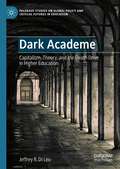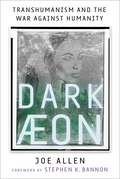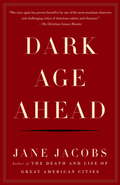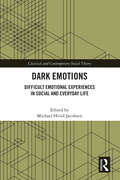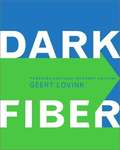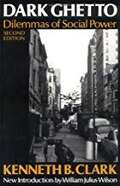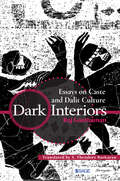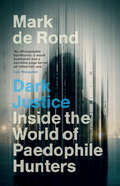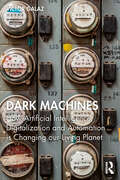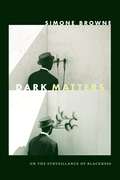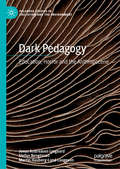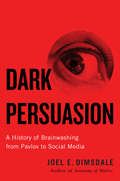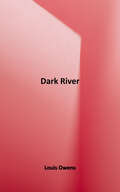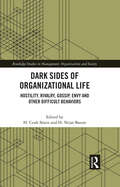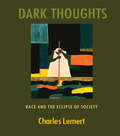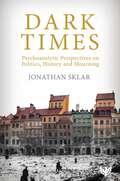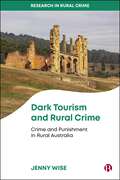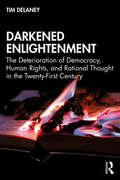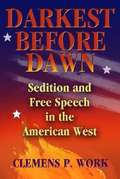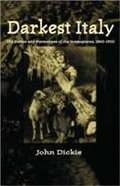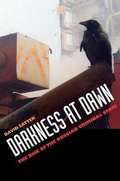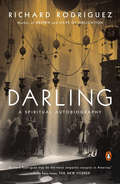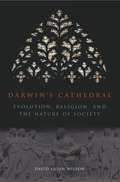- Table View
- List View
Dark Academe: Capitalism, Theory, and the Death Drive in Higher Education (Palgrave Studies on Global Policy and Critical Futures in Education)
by Jeffrey R. Di LeoThis book argues that a critical understanding of dark academe is vital to the futures of democracy and education. Drawing upon contemporary literary and cultural theory, particularly, affect theory, queer epistemology, and critical race theory as well as critiques of capitalism and accounts of the death drive, it builds a case for identifying dark academe as anything that prohibits the pursuit of democratic education and critical citizenship. It also argues that dark times require a reassessment of the ways theory and knowledge are approached in the humanities. This is necessary if the aim is to truly understand the darkness at the heart of the higher education today. Dark academe works to negate education and learning by continuously telling us that the quest for knowledge is empty, and the pursuit of critique is blind. In this educational darkness, the death drive of neoliberal academe becomes a force that works against intellectual transformation and the deepening of critical sights.
Dark Aeon: Transhumanism and the War Against Humanity
by Joe AllenHumanity Is Consumed by Relentless Transformation Like a thief in the night, artificial intelligence has inserted itself into our lives. It makes important decisions for us every day. Often, we barely notice. As Joe Allen writes in this groundbreaking book, &“Transhumanism is the great merger of humankind with the Machine. At this stage in history, it consists of billions using smartphones. Going forward, we&’ll be hardwiring our brains to artificial intelligence systems.&” The world-famous robot, Sophia, symbolizes a rising techno-religion. She takes her name from the goddess—or Aeon—whose fall from grace is described in the Gnostic Gospels. With an academic background in both science and theology, Allen confronts the paradox of what he calls &“good people constructing a digital abomination.&” Dark Aeon is nothing less than a cri de coeur for humanity itself. He takes us on a roller coaster ride through history and the emergence of Scientism, and from government-mandated mRNA vaccines to the weird visions of cyborg billionaires like Elon Musk. From Silicon Valley to China, these globalists&’ visions of humanity&’s future, exposed and described in Dark Aeon, are dire and terrifying. But Joe Allen argues that humanity&’s salvation is within our grasp. Only if we refuse to avert our eyes from the impending twilight before us.
Dark Age Ahead
by Jane JacobsIn this indispensable book, urban visionary Jane Jacobs--renowned author of The Death and Life of Great American Cities and The Economy of Cities--convincingly argues that as agrarianism gives way to a technology-based future, we stand on the brink of a new dark age, a period of cultural collapse. Jacobs pinpoints five pillars of our culture that are in serious decay: community and family; higher education; the effective practice of science; taxation, and government; and the self-regulation of the learned professions. The corrosion of these pillars, Jacobs argues, is linked to societal ills such as environmental crisis, racism, and the growing gulf between rich and poor. But this is a hopeful book as well as a warning. Drawing on her vast frame of reference-from fifteenth-century Chinese shipbuilding to Ireland's cultural rebirth-Jacobs suggests how the cycles of decay can be arrested and our way of life renewed. Invigorating and accessible, Dark Age Ahead is not only the crowning achievement of Jane Jacobs' career, but one of the most important works of our time.From the Trade Paperback edition.
Dark Emotions: Difficult Emotional Experiences in Social and Everyday Life (ISSN)
by Michael Hviid JacobsenDark Emotions is a book about a range of emotional experiences that are often regarded or characterized as ‘negative’, ‘disturbing’ or ‘dark’ as contrasted with emotions that are ‘positive’, ‘pleasant’ or ‘light’.Each chapter in the book is devoted to introducing different ‘dark emotions’ such as disappointment, betrayal, worry, regret, resentment and alienation and seeks to show – through conceptual, theoretical and empirical examples – how these emotions influence peoples’ lives and their relations to self, others and society. The book thus provides an overview of some dark emotions that are recognizable in our everyday lives and culture. It contains accessible introductions and relevant theoretical and empirical research on 12 different kinds of ‘dark emotions’. The chapters are highly useful for teaching sessions and research contexts. Additionally, they provide extensive lists of references for further reading.The book will be particularly useful for students or scholars with an interest in emotion research or related areas, and the book may inspire further investigation of the often- overlooked emotions presented in this volume.
Dark Fiber: Tracking Critical Internet Culture
by Geert LovinkAccording to media critic Geert Lovink, the Internet is being closed off by corporations and governments intent on creating a business and information environment free of dissent. Calling himself a radical media pragmatist, Lovink envisions an Internet culture that goes beyond the engineering culture that spawned it to bring humanities, user groups, social movements, nongovernmental organizations (NGOs), artists, and cultural critics into the core of Internet development. In Dark Fiber, Lovink combines aesthetic and ethical concerns and issues of navigation and usability without ever losing sight of the cultural and economic agendas of those who control hardware, software, content, design, and delivery. He examines the unwarranted faith of the cyber-libertarians in the ability of market forces to create a decentralized, accessible communication system. He studies the inner dynamics of hackers' groups, Internet activists, and artists, seeking to understand the social laws of online life. Finally, he calls for the injection of political and economic competence into the community of freedom-loving cyber-citizens, to wrest the Internet from corporate and state control. The topics include the erosion of email, bandwidth for all, the rise and fall of dot-com mania, techno-mysticism, sustainable social networks, the fight for a public Internet time standard, the strategies of Internet activists, mailing list culture, and collaborative text filtering. Stressing the importance of intercultural collaboration, Lovink includes reports from Albania, where NGOs and artists use new media to combat the country's poverty and isolation; from Taiwan, where the September 1999 earthquake highlighted the cultural politics of the Internet; and from Delhi, where a new media center explores free software, public access, and Hindi interfaces.
Dark Ghetto: Dilemmas of Social Power
by William Julius Wilson Kenneth B. Clark Gunnar MyrdalDescribes how the ghetto separates Blacks not only from white people, but also from opportunities and resources.
Dark Ghettos
by Tommie ShelbyFor Tommie Shelby, the persistence of ghettos raises many thorny questions of morality, and he offers practical answers framed in terms of what justice requires of government and its citizens. His social vision and political ethics calls for putting the abolition of ghettos at the center of reform.
Dark Interiors: Essays on Caste and Dalit Culture
by Raj Gauthaman S. Theodore Baskaran (Translator)‘Except women and dalits, I do not think there is anyone discriminated at birth.’ These words give an idea of Raj Gauthaman’s succinct and provocative critique, translated into English for the first time by Theodore Baskaran. The essays engage with dalit liberation politics, the relationship of dalits with Tamil history and the many strands that constitute radical dalit culture. Gauthaman discusses dalit history and what the progress of non-brahmin politics in Tamil Nadu has meant for dalits. This analysis of the alternative cultural expressions of dalits, politics, art and literature comes from essays written in 1992–2002, which remain perennial and startlingly new. The author’s discussion of Iyothee Thass Pandithar—who preceded Ambedkar by 50 years—of Ambedkar and Periyar, of postmodernism and Subaltern Studies, provides a new cultural history that tells us about dalit assertion today.
Dark Justice: Inside the World of Paedophile Hunters
by Mark de RondIt is difficult to imagine a more heinous crime than the sexual abuse of children. Yet, terrifyingly, a new case of child sexual abuse is reported every seven minutes. In response to this crisis, self-appointed groups of citizens are fashioning themselves as 'paedophile hunters.' Operating outside the law, these groups use social media to bait and expose those seeking to engage children sexually, both on- and offline. Their work has been remarkably effective, but at what cost? Following four years of unprecedented access to the UK's most prolific team of paedophile hunters, Mark de Rond offers balanced and insightful answers to the perplexing question of why these groups persist in using extreme methods to hold predators to account in view of less harmful alternatives. In doing so, he invites us to consider the societal impacts of paedophile hunters on our laws and institutions, as well as societal cohesion and safety.
Dark Machines: How Artificial Intelligence, Digitalization and Automation is Changing our Living Planet
by Victor GalazThis book offers a critical primer on how Artificial Intelligence and digitalization are shaping our planet and the risks posed to society and environmental sustainability.As the pressure of human activities accelerates on Earth, so too does the hope that digital and artificially intelligent technologies will be able to help us deal with dangerous climate and environmental change. Technology giants, international think-tanks and policy-makers are increasingly keen to advance agendas that contribute to “AI for Good” or “AI for the Planet." Dark Machines explores why it is naïve and dangerous to assume converging forces of a growing climate crisis and technological change will act synergistically to the benefit of people and the planet. It explores why AI and associated digital technologies may lead to accelerated discrimination, automated inequality, and augmented diffusion of misinformation, while simultaneously amplifying risks for people and the planet. We face a profound challenge. We can either allow AI accelerate the loss of resilience of people and our planet, or we can decide to act forcefully in ways that redirects its destructive direction.This urgent book will be of interest to students and researchers with an interest in Artificial Intelligence, digitalization and automation, social and political dimensions of science and technology, and sustainability sciences.
Dark Matters: On the Surveillance of Blackness
by Simone BrowneIn Dark Matters Simone Browne locates the conditions of blackness as a key site through which surveillance is practiced, narrated, and resisted. She shows how contemporary surveillance technologies and practices are informed by the long history of racial formation and by the methods of policing black life under slavery, such as branding, runaway slave notices, and lantern laws. Placing surveillance studies into conversation with the archive of transatlantic slavery and its afterlife, Browne draws from black feminist theory, sociology, and cultural studies to analyze texts as diverse as the methods of surveilling blackness she discusses: from the design of the eighteenth-century slave ship Brooks, Jeremy Bentham's Panopticon, and The Book of Negroes, to contemporary art, literature, biometrics, and post-9/11 airport security practices. Surveillance, Browne asserts, is both a discursive and material practice that reifies boundaries, borders, and bodies around racial lines, so much so that the surveillance of blackness has long been, and continues to be, a social and political norm.
Dark Pedagogy: Education, Horror and the Anthropocene (Palgrave Studies in Education and the Environment)
by Jonas Andreasen Lysgaard Stefan Bengtsson Martin Hauberg-Lund LaugesenDark pedagogy explores how different perspectives can be incorporated into a darker understanding of environmental and sustainability education. Drawing on the work of the classic horror author H.P. Lovecraft and new materialist insights of speculative realism, the authors link Lovecraft’s ‘tales of the horrible’ to the current spectres of environmental degradation, climate change, and pollution. In doing so, they draw parallels between how humans have always related to the ‘horrible’ things that are scaled beyond our understanding and how education can respond to an era of climate catastrophe in the age of the Anthropocene. A new and darker understanding of environmental and sustainability education is thus developed: using the tripartite reaction pattern of denial, insanity and death to frame the narrative, the book subsequently examines the specific challenges of potentials of developing education and pedagogy for an age of mass extinction. This unflinching book will appeal to students and scholars of dark pedagogies as well as those interested in environment and sustainability education.
Dark Persuasion: A History of Brainwashing from Pavlov to Social Media
by Joel E. DimsdaleA harrowing account of brainwashing&’s pervasive role in the twentieth and twenty-first centuries This gripping book traces the evolution of brainwashing from its beginnings in torture and religious conversion into the age of neuroscience and social media. When Pavlov introduced scientific approaches, his research was enthusiastically supported by Lenin and Stalin, setting the stage for major breakthroughs in tools for social, political, and religious control. Tracing these developments through many of the past century&’s major conflagrations, Dimsdale narrates how when World War II erupted, governments secretly raced to develop drugs for interrogation. Brainwashing returned to the spotlight during the Cold War in the hands of the North Koreans and Chinese. In response, a huge Manhattan Project of the Mind was established to study memory obliteration, indoctrination during sleep, and hallucinogens. Cults used the techniques as well. Nobel laureates, university academics, intelligence operatives, criminals, and clerics all populate this shattering and dark story—one that hasn&’t yet ended.
Dark River: A Novel (American Indian Literature and Critical Studies Series)
by Louis OwensJacob Nashoba's journey has taken him from his Choctaw homeland in Mississippi to Vietnam and finally to a small reservation in the mountains of eastern Arizona. A tribal ranger, he lives among people far different from any he has known. Balanced precariously between isolation and community, he is drawn to both the fastness of a remote river canyon and the Apaches who have come to be the only family he has. Nashoba's world is peopled by, among others, a bright young man who sells vision quests to romantic tourists, a determined elder whose power makes her a force to be reckoned with on the reservation, a resident anthropologist more "native" than the natives, a corrupt tribal chairman, a former Hollywood extra who shouts at reservation women the scraps of Italian he learned from other "Indian" actors, and the ranger's estranged wife. Confusion and violence follow their encounter with a right-wing militia group training secretly on tribal land. The contrast between these Rambo types and the various Native American characters typifies the sardonic humor running throughout this novel of contemporary Indian identity.
Dark Sides of Organizational Life: Hostility, Rivalry, Gossip, Envy and other Difficult Behaviors (Routledge Studies in Management, Organizations and Society)
by H Cenk Sözen H Nejat BasımExploring the darkest side of organizations may have a potential to change our previous assumptions about business life. Scholars both in management and organizational research fields have shown interest in the "bright" side of behavioral life and have looked for the ways to create a positive organizational climate and assumed a positive relation between happiness of employees and productivity. These main assumptions of the Human Relations School have dominated the scientific inquiry on organizational behavior. However, "the dark side of organizational life" may have more explanatory power than "the bright side". Hostility, jealousy, envy, rivalry, gossip, problematic personalities, dislike, revenge, and social exclusion are the realities of business life. A manager may devote most of their time to cope with conflicts, deviant behaviors, ambitious individuals, gossips, and dysfunctional rivalry among employees. It is evident that negative events and interactions among employees cost more time and energy for a manager than the positive side of organizational life. This edited collection specifically focuses on these issues and will be of interest to researchers, academics, and advanced students in the fields of management, organizational studies and behavior, sociology, social psychology, and human resource management.
Dark Sides of Organizational Life: Hostility, Rivalry, Gossip, Envy and other Difficult Behaviors (Routledge Studies in Management, Organizations and Society)
by H Cenk Sözen H Nejat BasımExploring the darkest side of organizations may have a potential to change our previous assumptions about business life. Scholars both in management and organizational research fields have shown interest in the "bright" side of behavioral life and have looked for the ways to create a positive organizational climate and assumed a positive relation between happiness of employees and productivity. These main assumptions of the Human Relations School have dominated the scientific inquiry on organizational behavior. However, "the dark side of organizational life" may have more explanatory power than "the bright side". Hostility, jealousy, envy, rivalry, gossip, problematic personalities, dislike, revenge, and social exclusion are the realities of business life. A manager may devote most of their time to cope with conflicts, deviant behaviors, ambitious individuals, gossips, and dysfunctional rivalry among employees. It is evident that negative events and interactions among employees cost more time and energy for a manager than the positive side of organizational life. This edited collection specifically focuses on these issues and will be of interest to researchers, academics, and advanced students in the fields of management, organizational studies and behavior, sociology, social psychology, and human resource management.
Dark Thoughts: Race and the Eclipse of Society
by Charles LemertIn Dark Thoughts, eminent sociologist Charles Lemert dares to say, and explain, what everyone already knows - that the modern world was built on the need of white people to pretend they are not as dark as the next person.Delving poignantly into the history and literature of domination, Lemert retells key moments of the twentieth-century by profiling figures like W.E.B. DuBois, Charlotte Perkins Gilman, Anna Julia Cooper, Nella Larson, Malcolm X, and Muhammad Ali. In a rare and unflinching look at his own complicated history, Lemert also explores his own racism, his struggle with the suicide of his oldest son, as well as growing up as the virtual son of a black mother and his life now as the real father of an African-American daughter. Dark Thoughts speaks to the most urgent social issues at the beginning of the twenty-first century: race relations, multiculturalism, and social justice.
Dark Times: Psychoanalytic Perspectives on Politics, History and Mourning
by Jonathan SklarToday sees the rise of nationalism, the return of totalitarian parties in Europe to electoral success, and the rise of the alt-right and white supremacists in the US. Thus, there is urgency for psychoanalysts, with their understanding of cruelty, sadomasochism, perversion, and other mental mechanisms, to speak out. Jonathan Sklar has risen to the challenge with this timely, thought-provoking, and, at times, upsetting work. Dark Times starts with a look at European history in terms of monuments and mourning, before moving into storytelling and the elision of thought and history at this current time, including harrowing detail of the brutalities inflicted by ISIS on the Yazidi, and concludes with a meditation on the relationship between cruelty in the early environment and hatred of the other within society, with particular focus on racism in the US. Sklar goes against the grain of brief sound bites, which are an aid to quickly pass over painful knowledge. Instead, he goes into detail to give extremely dark, horrid occurrences, and the human beings on the receiving end, respect and understanding, which enables the reader greater access to allowing unconscious things to be made more conscious, highlighting the quality of humanity in human beings. Also, listening to these stories enables us to become more aware, not only of what is going on over there, but also what is happening here, because in our increasingly joined-up world, here is always implicated and affected too. By ridding ourselves of the illusions of our political times, we can find greater freedom to think, develop, challenge, and create hope, for the future of our children and our grandchildren, as well as for ourselves. Dark Times is a timely, thought-provoking, and, at times, upsetting work that is a must- read for all those looking for a deeper understanding of today's world.
Dark Tourism and Rural Crime: Crime and Punishment in Rural Australia (Research in Rural Crime)
by Jenny WiseBringing a unique rural lens to the analysis of dark tourism in Australia, this book covers a range of sites including convict museums, sites of serial killings and colonial violence, ghost tours and the emerging tourism of bushfire sites. While some rural communities develop a ‘dark tourism strategy’ to maintain economic viability, others may distance themselves from what they perceive to be unethical tourism practices. Jenny Wise examines the roles geographical locations play in dark tourist sites, and how their histories are portrayed, considering how the concept of the rural idyll or dystopia plays a part in Australia’s national identity.
Darkened Enlightenment: The Deterioration of Democracy, Human Rights, and Rational Thought in the Twenty-First Century
by Tim DelaneyThe premise of Darkened Enlightenment is to highlight the fact that there currently exist a number of socio-political forces that have the design, or ultimate consequence, of trying to extinguish the light of reason and rationality. The book presents a critique of modernity and provides a socio-political and cultural analysis of world society in the early twenty-first century. Specifically, this analysis examines the deterioration of democracy, human rights, and rational thought. Key features include a combination of academic analysis that draws on numerous and specific examples of the growing darkness that surrounds us along with a balanced practical, everyday-life approach to the study of the socio-political world we live in through the use of popular culture references and featured boxes. The general audience will also be intrigued by these same topics that concern academics including: a discussion on the meaning of "fake news"; attacks on the media and a declaration of the news media as the "enemy of the people"; the rise of populism and nationalism around the world; the deterioration of freedom and human rights globally; the growing economic disparity between the rich and the poor; attempts to devalue education; a growing disbelief in science; attacks on the environment; pseudoscience as a by-product of unreasoned and irrational thinking; the political swamp; the power elites and the deep state; and the variations of Big Business that impact our daily lives. This book will make a great contribution to such fields as sociology, philosophy, political science, environmental science, public administration, economics, psychology, and cultural studies.
Darkest Before Dawn: Sedition and Free Speech in the American West
by Clemens P. WorkTwo weeks after the United States declared war on Germany in 1917, the town of Lewistown, Montana, held a patriotic parade. Less than a year later, a mob of 500 Lewistown residents burned German textbooks in Main Street while singing The Star Spangled Banner. In Lewistown's nationalistic fervor, a man was accused of being pro-German because he didn't buy Liberty Bonds; he was subsequently found guilty of sedition. Montana's former congressman Tom Stout was quoted in the town?s newspaper, The Democrat-News, "With our sacred honor and our liberties at stake, there can be but two classes of American citizens, patriots and traitors!" Darkest Before Dawn takes to task Montana's 1918 sedition law that shut down freedom of speech. The sedition law carried fines of up to $20,000 and imprisonment for as many as twenty years. It became a model for the federal sedition act passed in 1918. Clemens Work explores the assault on civil rights during times of war when dissent is perceived as unpatriotic. The themes of this cautionary tale clearly resonate in the events of the early twenty-first century.
Darkest Italy: The Nation and Stereotypes of the Mezzogiorno, 1860-1900
by John Dickie<p>Stereotypical representations of the Mezzogiorno are a persistent feature of Italian culture at all levels. In Darkest Italy, John Dickie analyzes these stereotypes in the post-Unification period, when the Mezzogiorno was widely seen as barbaric, violent or irrational, an "Africa" on the European continent. At the same time, this is the moment when the Mezzogiorno became a metaphor for the state of the country as a whole, the index of Italy’s modernity. <p>Dickie argues that these stereotypes, rather than being a symptom of the failings of national identity in Italy, were actually integral to the way Italy’s bourgeoisie imagined themselves as Italian. Drawing on recent theories of Otherness and national identity, Dickie brings a new light to an important and well-established area of Italian history--the relationship between the South and the nation as a whole.</p>
Darkness at Dawn: The Rise of the Russian Criminal State
by David SatterThis book tells the story of reform in Russia through the real experiences of individual citizens. Describing in detail the birth of a new era of repression, David Satter analyzes the changes that have swept Russia and their effect on Russia's age-old way of thinking. Through the stories of people at all levels of Russian society, Satter shows the contrast during the reform period between the desperation of the many and the insatiability of the few. With insights derived from more than twenty years of writing and reporting on Russia, he considers why the individual human being there has historically counted for so little. And he offers an illuminating analysis of how Russia's post-Soviet fate was decided when a new morality failed to fill the vast moral vacuum that communism left in its wake. --BOOK JACKET. Title Summary field provided by Blackwell North America, Inc. All Rights Reserved
Darling
by Richard RodriguezAn award-winning writer delivers a major reckoning with religion, place, and sexuality in the aftermath of 9/11 Hailed in The Washington Post as "one of the most eloquent and probing public intellectuals in America,” Richard Rodriguez now considers religious violence worldwide, growing public atheism in the West, and his own mortality. Rodriguez’s stylish new memoir-the first book in a decade from the Pulitzer Prize finalist-moves from Jerusalem to Silicon Valley, from Moses to Liberace, from Lance Armstrong to Mother Teresa. Rodriguez is a homosexual who writes with love of the religions of the desert that exclude him. He is a passionate, unorthodox Christian who is always mindful of his relationship to Judaism and Islam because of a shared belief in the God who revealed himself within an ecology of emptiness. And at the center of this book is a consideration of women-their importance to Rodriguez’s spiritual formation and their centrality to the future of the desert religions. Only a mind as elastic and refined as Rodriguez’s could bind these threads together into this wonderfully complex tapestry. .
Darwin's Cathedral: Evolution, Religion, and the Nature of Society
by David Sloan WilsonOne of the great intellectual battles of modern times is between evolution and religion. Until now, they have been considered completely irreconcilable theories of origin and existence. David Sloan Wilson's Darwin's Cathedral takes the radical step of joining the two, in the process proposing an evolutionary theory of religion that shakes both evolutionary biology and social theory at their foundations. The key, argues Wilson, is to think of society as an organism, an old idea that has received new life based on recent developments in evolutionary biology. If society is an organism, can we then think of morality and religion as biologically and culturally evolved adaptations that enable human groups to function as single units rather than mere collections of individuals? Wilson brings a variety of evidence to bear on this question, from both the biological and social sciences. From Calvinism in sixteenth-century Geneva to Balinese water temples, from hunter-gatherer societies to urban America, Wilson demonstrates how religions have enabled people to achieve by collective action what they never could do alone. He also includes a chapter considering forgiveness from an evolutionary perspective and concludes by discussing how all social organizations, including science, could benefit by incorporating elements of religion. Religious believers often compare their communities to single organisms and even to insect colonies. Astoundingly, Wilson shows that they might be literally correct. Intended for any educated reader, Darwin's Cathedral will change forever the way we view the relations among evolution, religion, and human society.
